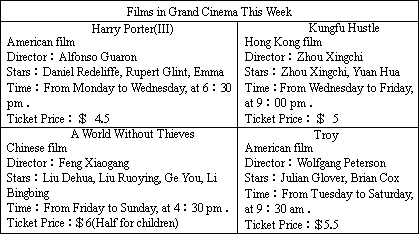题目内容
How Do You Make a Vegetable Soup?
1. 从以下10种东西中选出7种作为菜汤的选料。
some small pieces of beef ? sugar
2 potatoes salt
4 carrots water
2 oranges 4 small dumplings
1 cup of peas chips
2. 用以下动词填空.
drink/put/cut up(2)/cook(2)/wash/add(2)
1. _____ and _____ the vegetables.
2. _____ the beef into small pieces.
3. _____ the beef and vegetables in a pan.
4. _____ water and a little salt.
5. _____ slowly for half an hour.
6. _____ the dumplings.
7. _____ for another half an hour.
8. _____ the hot soup.
2. 1. Wash and cut up the vegetables.
2. Cut up the beef into small pieces.
3. Put the beef and vegetables in a pan.
4. Add water and a little salt.
5. Cook slowly for half an hour.
6. Add the dumplings.
7. Cook for another half an hour.
8. Drink the hot soup.

| |||||||||||||||||||||||||||||||||||||||||||||||||||||||||||
阅读理解
B
How much pocket money do you get from your parents every month? Maybe 200 yuan? But for Li Beibei, 30 yuan each month is enough. The only thing she buys is lunch—1.5 yuan each day. “Meat is too expensive for me,” said Li.
Li, 14, is a Junior 1 student at Beijing’s Xingzhi Experimental School. Her parents are migrant workers(外来务工人员). They came to Beijing from a village in Luohe, He’nan two years ago. Her father now works as a cleaner and gets 500 yuan every month. Her mother has no job.
Li Beibei has 460 friends at Xingzhi. Every day, Li gets up at 5:30 am and rides her bike for 20 minutes to get to school. Like many teens, Li has a lot of homework—usually at least one hour every day. But that is not all her work. During the weekdays she helps her mum cook. On weekends, she helps wash clothes. “I could cook when I was eight. Dad said sometimes I cook better than Mum!”
Li said she wanted to be a doctor. “I watch TV and find out there are many people with AIDS in He’nan. Some are kids. They need help,” said Li.
But she is afraid to leave school. “I hope I will always be in school,” said Li. “Dad works hard to get money. I promise him I will study hard to be a good student and a good doctor in the future.”
1.Li Beibei came from ______.
|
A.Beijing |
B.Liaoning |
C.He’nan |
D.Xingzhi |
2.Which of the following sentences is TRUE? ______.
|
A.The girl’s parents are both cleaners |
|
B.Her parents gave her 30 yuan to buy books |
|
C.The girl often helps her mother do some housework |
|
D.She studies hardest in her class |
3.She spends ______ on her homework everyday.
|
A.20 minutes |
B.over one hour |
|
C.half an hour |
D.two hours |
4.Her wish is to be a doctor because she wants to ______.
|
A.help poor farmers |
|
B.help the people with AIDS |
|
C.make her parents healthier |
|
D.help poor kids |
5.The best title of the passage should be ______.
|
A.A City Girl |
|
B.Hard But Happy Life |
|
C.A Village Girl’s Hope |
|
D.A Girl’s School Life |
